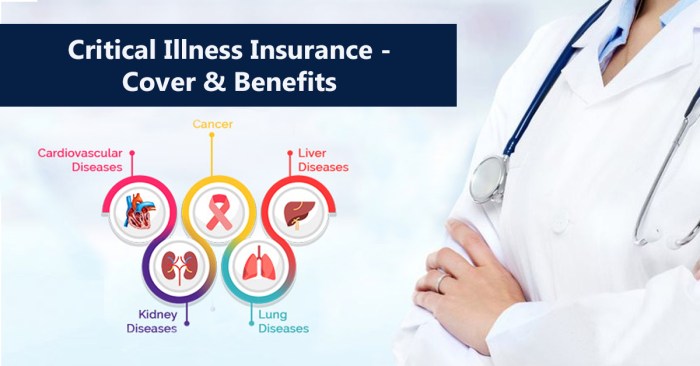Facing a critical illness is never easy, both emotionally and financially. The unexpected costs associated with diagnosis, treatment, and ongoing care can quickly overwhelm even the most well-prepared individuals. This is where critical illness insurance steps in, offering a crucial safety net in times of medical emergencies. In 2025, with advancements in medical technology and rising healthcare costs, understanding the benefits of critical illness insurance is more vital than ever.
Understanding Critical Illness Insurance: A Comprehensive Overview
Critical illness insurance is a type of supplemental health insurance policy that provides a lump-sum payout if you’re diagnosed with a specified critical illness. Unlike health insurance, which covers medical expenses, critical illness insurance provides financial support to help manage the non-medical costs associated with a serious illness. This financial assistance can significantly alleviate the stress and burden during a difficult time.
What Conditions are Typically Covered?
The specific conditions covered vary depending on the insurer and the policy, but common critical illnesses often included are:
- Cancer
- Heart attack
- Stroke
- Kidney failure
- Major organ transplant
- Multiple sclerosis
- Paralysis
- Alzheimer’s disease
- Parkinson’s disease
It’s crucial to carefully review the policy wording to understand the precise definition of each covered illness and any exclusions.
How Critical Illness Insurance Benefits You During Medical Emergencies
The lump-sum payment from critical illness insurance can be used for a variety of purposes, providing much-needed financial relief during a medical crisis:
- Medical expenses not covered by health insurance: This could include alternative therapies, experimental treatments, or long-term care not covered by your primary health plan.
- Lost income: If you’re unable to work due to illness, the payout can replace lost wages, ensuring financial stability for you and your family.
- Living expenses: Covering everyday costs like mortgage payments, utilities, and groceries can alleviate significant financial pressure during treatment.
- Debt repayment: The payout can help reduce or eliminate existing debt, preventing further financial strain.
- Home modifications: If your illness requires home adaptations, the insurance can help cover these costs.
- Caregiver support: The payout can help cover the cost of hiring a caregiver if needed.
Choosing the Right Critical Illness Insurance Policy
Selecting the right policy requires careful consideration of several factors:
Factors to Consider When Choosing a Critical Illness Insurance Policy
- Coverage amount: Determine how much coverage you need based on your potential medical expenses and lifestyle.
- Covered illnesses: Compare the list of covered illnesses across different policies to ensure it aligns with your needs.
- Waiting periods: Understand the waiting period before coverage begins after policy purchase.
- Premium costs: Balance the cost of premiums with the level of coverage you require.
- Insurer reputation: Choose a reputable and financially stable insurer.
- Policy exclusions and limitations: Carefully review the policy document to understand any exclusions or limitations.
Critical Illness Insurance vs. Other Health Insurance Options
It’s important to understand how critical illness insurance differs from other types of health insurance:

Source: moneyreverie.com
- Health insurance: Covers medical expenses such as doctor visits, hospital stays, and medications. It typically doesn’t cover lost income or non-medical expenses related to a critical illness.
- Disability insurance: Replaces a portion of your income if you become unable to work due to illness or injury. It doesn’t cover medical expenses.
- Long-term care insurance: Covers the costs of long-term care services, such as nursing homes or in-home care. It’s often designed for those with chronic conditions requiring extensive care.
Critical illness insurance complements these other forms of insurance, offering a unique financial safety net during a critical illness.
The Importance of Critical Illness Insurance in 2025
The rising costs of healthcare and the increasing prevalence of critical illnesses make critical illness insurance an increasingly important financial planning tool in 2025. Advancements in medical technology, while beneficial, often lead to higher treatment costs. A critical illness can quickly deplete savings and create significant financial hardship. Critical illness insurance provides a financial buffer to help navigate these challenges.
Frequently Asked Questions (FAQ)
Q: How much does critical illness insurance cost?
A: The cost of critical illness insurance varies depending on factors like age, health status, coverage amount, and the insurer. It’s best to obtain quotes from multiple insurers to compare prices.
Q: Can I get critical illness insurance if I already have a pre-existing condition?
A: This depends on the insurer and the specific condition. Some insurers may offer coverage with exclusions or higher premiums. It’s important to disclose all relevant health information when applying.
Q: What happens if I’m diagnosed with more than one critical illness?

Source: sbsfin.com
A: Most policies will pay out for each covered critical illness, though there may be limitations or specific conditions Artikeld in the policy document. It’s crucial to carefully review the policy terms.
Q: How long does it take to receive the payout?
A: The time it takes to receive the payout varies depending on the insurer and the process of verifying the diagnosis. It usually takes several weeks.
Q: Can I use the payout for anything I want?
A: Yes, the payout is typically tax-free and can be used for any purpose you deem necessary, such as medical expenses, living expenses, debt repayment, or other financial needs.
Sources
While specific links to insurance companies are avoided to maintain neutrality, you can find reliable information on critical illness insurance from reputable sources such as government health websites (check your country’s specific sites), independent financial advice websites, and the websites of well-established insurance providers.
Call to Action
Don’t wait until a critical illness strikes to consider the importance of financial protection. Contact a financial advisor or insurance broker today to explore your critical illness insurance options and secure your financial future. Protect yourself and your loved ones with the peace of mind that comes with adequate critical illness coverage.
Commonly Asked Questions
What illnesses are typically covered by critical illness insurance?
Commonly covered illnesses include cancer, heart attack, stroke, kidney failure, and major organ transplants. Specific coverage varies by policy.

Source: roughnotes.com
How much coverage should I get?
The amount of coverage depends on your individual circumstances, including your age, health, income, and existing debts. Consult a financial advisor to determine the appropriate level of coverage.
Can I still get coverage if I have pre-existing conditions?
Some insurers may offer coverage, but pre-existing conditions might affect your eligibility or premiums. Disclosure is crucial during the application process.
How much does critical illness insurance cost?
Premiums vary based on factors like age, health, coverage amount, and the insurer. Getting quotes from multiple insurers is recommended.
